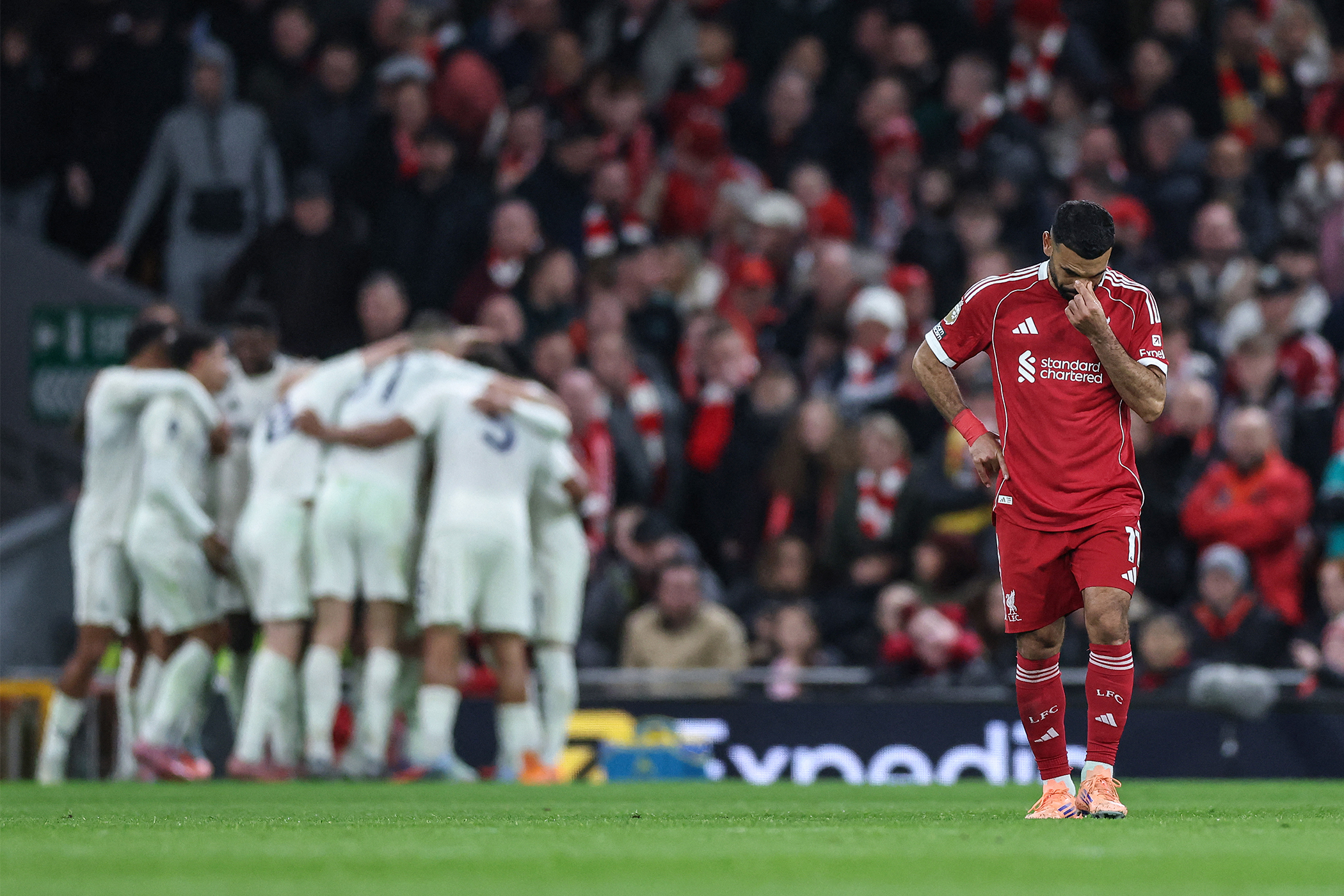Anfield’s patience finally snapped about an hour into yet another defeat, yet another afternoon of frustration and dismay, yet another game that ended with the distinct impression Liverpool are sinking deeper into their malaise, rather than starting to emerge from it.
Last season, Ryan Gravenberch seemed to embody the deft, judicious management that allowed Arne Slot to win the Premier League title at his first attempt. The 23-year-old had been a fringe player under Jürgen Klopp; Slot, adroitly, turned him into one of the finest midfield pivots in the league.
That credit, it would seem, has run out. Early in the second half, with Nottingham Forest two ahead and Liverpool desperately seeking some sort of spark, the crowd adjudicated that Gravenberch had shirked a tackle, shrinking in the face of the white-hot intensity of Elliott Anderson and Morgan Gibbs-White. Growls of disapproval washed down the Kop and rumbled around the ground. Enough, they had decided, was enough.
Gravenberch would not be the last. Even as Liverpool’s season has screeched to a premature halt over the last two months, Anfield has been broadly supportive, not only basking in the afterglow of that cherished 20th title but understanding, too, that these players are facing a challenge infinitely more delicate and wholly less predictable than bedding in new players or adapting to a new system.
They are, as Andy Robertson so eloquently reminded the world after Scotland’s qualification for the World Cup, continually attempting to come to terms with the absence of Diogo Jota. How that has affected Liverpool’s players is an issue, it would seem, that has largely been too complex for football as a whole to comprehend; it is treated, all too often, as equivalent to a long-term injury, something that the team will be able to shake off. That is not, obviously, how grief works; intuiting that, Anfield has shown not just camaraderie but compassion.
That will continue to be true, but there is something inexplicably primal about watching your football team lose, about seeing an opponent revel in looming victory, about feeling as though everything is falling apart. It is a feeling too strong to be held at bay by the conscious, logical mind.
As Liverpool sagged, then, Anfield turned. Nobody was immune. There were howls of displeasure at Alexis Mac Allister misplacing a pass. There was grumbling as Curtis Jones turned into trouble. There were even groans at Dominik Szoboszlai, by far Liverpool’s best player this season, wasting a chance to shoot.
The anger will have hurt, but – to borrow the mantra of parenting – the disappointment is far worse. The stadium had started to empty long before Gibbs-White added Forest’s third. Those who remained tried, half-heartedly, to rouse a defiant chorus of You’ll Never Walk Alone. It did not catch. Everyone was too busy watching Anderson and Gibbs-White excitedly, giddily hunting a fourth, wondering how bad it could get.
It is precisely that question that now confronts Slot. Liverpool’s problems are many and varied. They are horribly vulnerable to set pieces. They are so predictable that Sean Dyche, the Forest manager, told his players “not to bother” playing out, because “they will press the life out of you”. They habitually concede the first goal. “Almost every time” they concede a chance, Slot said, “the ball goes in.” They do not create enough chances to make up for that glaring shortcoming. When they do muster some sort of threat, they lack composure.
Most troubling of all, the self-belief that seemed so innate in Slot’s first season has evaporated. He made his first substitution in the 55th minute here, with his team already 2-0 down. Hugo Ekitike came on for Ibrahima Konaté. Gravenberch shifted back into defence. From the look on his face, he was not entirely happy about it.
Newsletters
Choose the newsletters you want to receive
View more
For information about how The Observer protects your data, read our Privacy Policy
Quite where Ekitike was playing was not obvious. Maybe he was alongside Alexander Isak. Maybe Isak was not playing. It is hard to remember. Or maybe he was out on the left. A few minutes later, more changes: Robertson for Milos Kerkez and Federico Chiesa for Isak. Slot said it was a “3-3-4,” but it appeared that Chiesa had been instructed by his manager just to run around a lot. Jones was playing as both full-backs and a number 10.
This is the form many of Liverpool’s games have taken this season, the system failing, chaos descending, every move by Slot carrying the scent of desperation. Since September, none of them have worked.
What lies at the root of that cannot be boiled down into a convenient list. There is the pall cast by the loss of Jota: Slot does not want to be seen to use it as an excuse, but it may be at least a partial explanation.
The club’s summer recruitment, too, may in years to come be used as a parable: spending a lot of money in the transfer market does not, in any way, guarantee success. Slot’s attempts to change the way his team plays have failed to such an extent that they have now, it would seem, forgotten even how to make the tried-and-trusted shape that delivered the championship last year work.
Nor do any of those exist in isolation: they intertwine and compound each other, presenting Slot with a fiendishly difficult problem to unpick. That, perhaps, is the real root of the frustration, of the anger, of the disappointment: that yet another week has gone by, and he seems no closer to working out how to solve it.
Photograph by Darren Staples/AFP via Getty Images



